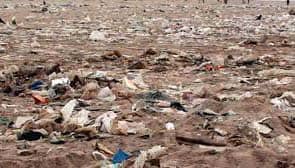Soil Pollution | An Essay
Soil Pollution
Introduction:
Soil is a complex mixture of minerals, organic matter, water, air, and living organisms that forms the uppermost layer of the Earth’s crust. Soil is a precious natural resource that plays a vital role in sustaining life on Earth.
Why is Soil an Important Element:
Nutrient Cycling: Soil serves as a reservoir and source of essential nutrients for plants, which are necessary for their growth and development. Through a process called nutrient cycling, soil organisms break down organic matter and release nutrients that can be taken up by plants. These nutrients, such as nitrogen, phosphorus, and potassium, are essential for the production of healthy crops, which in turn provide food for humans and animals.
Plant Growth and Habitat: Soil acts as a medium for plant growth by anchoring the roots, providing support, and supplying water. It also acts as a reservoir for soil moisture, allowing plants to access water during dry periods. Additionally, soil provides a habitat for a diverse range of organisms, including microorganisms, insects, worms, and small animals, which contribute to the overall health and balance of ecosystems.
Water Filtration and Storage: Soil plays a crucial role in the hydrological cycle. It acts as a natural filter, removing impurities and pollutants from water as it percolates through the soil layers. Soil also has the ability to store and release water, helping to regulate water availability and prevent floods or droughts. The capacity of soil to retain water is influenced by its texture, structure, and organic content.
Carbon Sequestration: Soil is a significant reservoir of carbon. It stores carbon through the decomposition of organic matter and the action of soil organisms. This process, known as carbon sequestration, helps mitigate climate change by reducing the amount of carbon dioxide in the atmosphere and storing it in the soil, thus acting as a carbon sink.
Biodiversity and Ecological Balance: Healthy soil supports a diverse range of organisms, including bacteria, fungi, algae, insects, and worms. These organisms contribute to the decomposition of organic matter, nutrient cycling, and the formation of soil structure. Soil biodiversity is crucial for maintaining ecological balance, promoting plant health, and supporting a wide range of ecosystem services.
Causes of Soil Pollution:
There are some salient causes of Soil Pollution, such as:
Industrial Activities: Industrial processes and activities generate vast amounts of waste materials that often contain hazardous chemicals and heavy metals. Improper disposal of industrial waste contaminates the soil, leading to soil pollution.
Agricultural Practices: The overuse and misuse of agrochemicals such as pesticides, herbicides, and fertilizers contribute significantly to soil pollution. Excessive application of these substances leads to the accumulation of toxic residues in the soil, disrupting its natural composition and fertility.
Improper Waste Disposal: Improper disposal of household waste, sewage sludge, and landfill leachate can introduce harmful substances into the soil. When these waste materials are not adequately treated or managed, they leach into the soil, contaminating it with toxins and pollutants.
Mining Activities: Mining operations extract minerals from the Earth’s crust, often resulting in the release of heavy metals, such as lead, mercury, and cadmium, into the soil. These metals persist in the environment and have long-lasting detrimental effects on soil health.
Deforestation: Deforestation disrupts the delicate balance of ecosystems, leading to soil erosion. The removal of vegetation cover exposes the topsoil to erosion by wind and water, resulting in the loss of valuable soil nutrients and organic matter.
Effects of Soil Pollution:
The effects of soil pollution are as follows:
Reduced Agricultural Productivity: Soil pollution diminishes soil fertility, affecting crop growth and productivity. Contaminated soil lacks essential nutrients and may contain toxic substances that can stunt plant growth, reduce crop yields, and lower agricultural output.
Water Contamination: Pollutants in the soil can leach into groundwater reserves, contaminating drinking water sources. This poses a serious health risk to humans and wildlife, as the polluted water can carry harmful substances over long distances.
Biodiversity Loss: Soil pollution can disrupt the delicate balance of ecosystems, leading to the loss of plant and animal species. Contaminated soil affects the organisms living within it, leading to a decline in biodiversity and ecological imbalances.
Health Impacts: Soil pollution can have direct and indirect effects on human health. The consumption of crops grown in contaminated soil can expose humans to toxic substances, leading to various health issues, including gastrointestinal problems, organ damage, and even cancer.
Solutions to Soil Pollution:
Sustainable Agricultural Practices: Encouraging farmers to adopt sustainable agricultural practices, such as organic farming and integrated pest management, can minimize the use of harmful chemicals and promote soil health.
Proper Waste Management: Implementing effective waste management strategies, including recycling, composting, and hazardous waste disposal, is crucial to prevent the introduction of pollutants into the soil.
Reforestation and Afforestation: Planting trees and restoring vegetation in deforested areas can help prevent soil erosion, protect topsoil, and improve soil fertility.
Soil Remediation Techniques: Employing soil remediation techniques, such as bioremediation, phytoremediation, and soil washing, can help remove or neutralize contaminants, restoring the soil to a healthy state.
Education and Awareness: Raising awareness about soil pollution, its causes, and potential solutions is vital. Educating the public, farmers, and industries about the importance of soil conservation and responsible practices can drive positive change. 0 0 0.
Books of Literary Criticism by M. Menonimus:
- World Short Story Criticism
- World Poetry Criticism
- World Drama Criticism
- World Novel Criticism
- World Essay Criticism
- Indian English Poetry Criticism
- Indian English Poets and Poetry Chief Features
- Emily Dickinson’s Poetry-A Thematic Study
- Walt Whitman’s Poetry-A Thematic Study
- Critical Essays on English Poetry
- Tawfiq al-Hakim’s Novel: Return of the Spirit-An Analytical Study
- Tawfiq al-Hakim’s Novel: ‘Yawmiyyat Naib Fil Arayaf’-An Analytical Study
- Analytical Studies of Some Arabic Short Stories
- A Brief History of Arabic Literature: Pre-Islamic Period (500 AD-622 AD)
- A Brief History of Arabic Literature: Early Islamic Period (622 AD-661 AD)
- Reviews on William Shakespeare’s Works …
Additional Searches:











